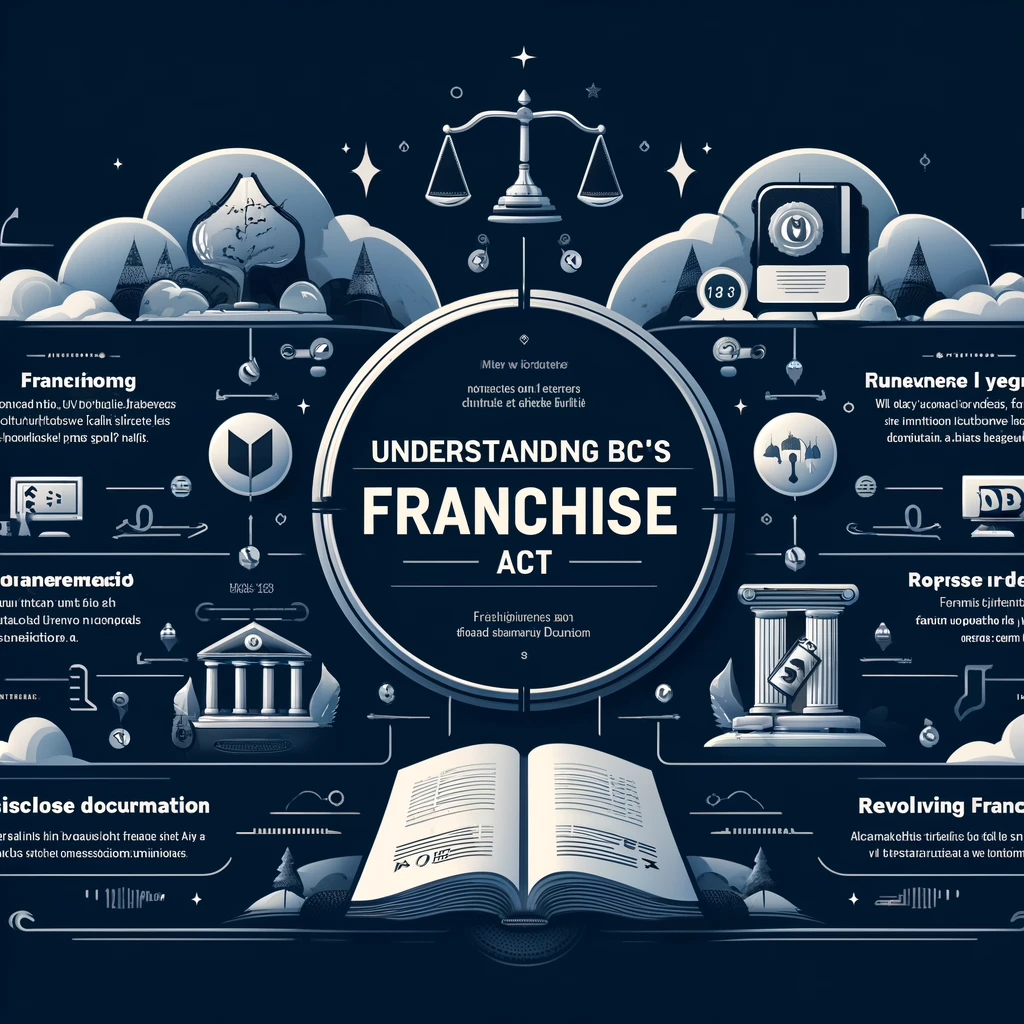Table of contents
Franchising in British Columbia (BC) represents a vibrant sector of the economy, offering both franchisors and franchisees significant opportunities for growth and profitability. However, navigating the complex landscape of franchise law is crucial to ensure success and compliance. This blog post explores the key legal considerations both parties must address when embarking on franchising ventures in BC.
1. Understanding the Regulatory Framework
In BC, franchises are primarily regulated under the British Columbia Franchises Act, which came into effect in February 2017. This legislation is designed to protect franchisees by requiring franchisors to provide extensive disclosure prior to any agreements being signed. The Act aligns with similar laws in other Canadian provinces, such as Alberta, Manitoba, Ontario, and New Brunswick, providing a cohesive regulatory framework across the country.
Key provisions of the Act include:
- Disclosure Requirements: Franchisors must provide a disclosure document at least 14 days before the franchise agreement is signed or any payment is made. This document should include details about the franchisor’s business history, a list of other franchisees, financial statements, and any material facts that may affect the franchise’s value or operations.
- Right of Rescission: Franchisees have the right to rescind the agreement within 60 days if they receive the disclosure document less than 14 days before signing the agreement, or if the disclosure document is materially deficient.
- Fair Dealing: Both parties are required to perform their obligations under the franchise agreement with fair dealing, which includes acting in good faith and in accordance with reasonable commercial standards.
2. The Importance of Due Diligence
For franchisors, conducting thorough due diligence on potential franchisees is critical. This includes evaluating the financial capabilities, business acumen, and market understanding of the franchisee. Franchisors should also assess the suitability of the location, local market conditions, and the potential for brand expansion in the area.
Franchisees, on the other hand, must perform their own due diligence on the franchisor. This involves reviewing the disclosure document in detail, understanding the franchisor’s business model, financial health, and the track record of other franchise locations. Consulting with existing franchisees can provide invaluable insights into the actual operations and profitability of the business.
3. Structuring the Franchise Agreement
The franchise agreement is the cornerstone of the franchisor-franchisee relationship. It must clearly outline the rights and obligations of each party. Important clauses that should be included are:
- Fees and Royalties: Details of initial franchise fees, ongoing royalties, and any advertising or marketing fees.
- Territorial Rights: Defines the territory in which the franchisee can operate and whether exclusivity is granted.
- Duration and Renewal: Specifies the term of the franchise agreement and the conditions under which it can be renewed.
- Operations Manual: Requirement for the franchisee to adhere to the franchisor’s operations manual.
- Termination: Conditions under which the agreement can be terminated by either party.
4. Intellectual Property Considerations
Intellectual property (IP) is a vital asset in franchising. Franchisors must ensure that their trademarks, trade names, proprietary information, and operational methods are adequately protected under Canadian IP laws. This involves registering trademarks and ensuring consistent use and enforcement.
Franchisees must understand their rights and limitations regarding the use of the franchisor’s IP. Typically, the franchise agreement will detail how IP can be used, any restrictions, and the consequences of misuse or infringement.
5. Dispute Resolution
Disputes can arise in any business relationship, and franchising is no exception. The franchise agreement should specify the methods for dispute resolution, whether through mediation, arbitration, or litigation. Both parties should aim for resolution methods that are cost-effective and minimal in disruption to ongoing operations.
6. Ongoing Obligations and Support
Franchisors are generally required to provide ongoing support to franchisees, which can include training, marketing, and operational advice. This support is crucial for maintaining brand standards and ensuring the success of the franchise.
Franchisees must comply with the franchisor’s operational guidelines and participate in promotional activities. Staying engaged with the franchisor’s updates and adapting to changes in the business model is essential for sustained success.

Franchising in British Columbia offers exciting opportunities but comes with its own set of legal considerations. Both franchisors and franchisees must thoroughly understand their rights and obligations under the BC Franchises Act and ensure their agreements and business practices are in full compliance. By focusing on due diligence, clear contractual agreements, and mutual support, both parties can build a prosperous and enduring business relationship.
FAQ
A franchise is a type of business where the owner (franchisor) grants a license to a third-party (franchisee) to operate a business using the franchisor’s brand, trademark, and business model in exchange for a fee. This setup allows franchisees to benefit from established business systems and brand recognition.
In British Columbia, franchising is regulated under the British Columbia Franchises Act. This legislation requires franchisors to provide potential franchisees with a comprehensive disclosure document and to deal fairly and in good faith.
The franchise disclosure document must include information about the franchisor’s business and legal history, a list of current franchisees, audited financial statements, details of any litigation involving the franchisor, the initial and ongoing costs to operate the franchise, and the terms and conditions of the franchise agreement.
The cooling-off period in BC allows a franchisee to rescind the franchise agreement without penalty within 60 days if the disclosure document was not provided at least 14 days before the agreement was signed or if the disclosure document was substantially incomplete.
Yes, most franchise agreements include a non-compete clause that restricts the franchisee from operating or being involved in a competing business during the term of the franchise and often for a reasonable period thereafter. The specific terms and enforceability of non-compete clauses can vary, so it is important to review them carefully.
Disputes are generally resolved according to the dispute resolution mechanism outlined in the franchise agreement. This might include mediation, arbitration, or litigation. Franchisors and franchisees are encouraged to use mediation or arbitration to resolve disputes amicably and cost-effectively.
A franchisee’s ongoing obligations typically include paying royalties and marketing fees, adhering to the franchisor’s operational standards, participating in training programs, and regularly updating equipment and services as required by the franchisor.
The conditions under which a franchise agreement can be terminated should be outlined in the contract. Common reasons include breach of contract, failure to pay fees, insolvency, or mutual agreement. Both parties must understand the termination clauses and the implications of ending the franchise agreement.
Foreign franchisors looking to expand into British Columbia must comply with the same regulations as domestic franchisors, including the requirement to provide a detailed disclosure document. Additionally, they should consider how cultural differences and local market dynamics may affect their business model.
Prospective franchisors and franchisees can consult with legal experts specializing in franchise law, contact the British Columbia Ministry of Jobs, Trade and Technology, or seek advice from experienced consultants in the franchising sector. Additionally, resources like the Canadian Franchise Association provide valuable information and support for franchise operations.
Pax Law can help you!
Contact Heena Han, a lawyer at Pax Law Corporation, where expertise and dedication converge to resolve your business law needs. As a knowledgeable lawyer with a profound understanding of Canadian business law, Heena Han offers strategic guidance and advocacy for navigating complex business legal matters. Whether it’s forming a corporation, handling commercial disputes, or advising on compliance issues, Pax Law Corporation is your trusted partner in managing your business law matters. Secure your business’s future by reaching out to Heena Han today
Our lawyers and consultants are willing, ready, and able to assist you. Please visit our appointment booking page to make an appointment with one of our lawyers or consultants; alternatively, you can call our offices at +1-604-767-9529.



0 Comments